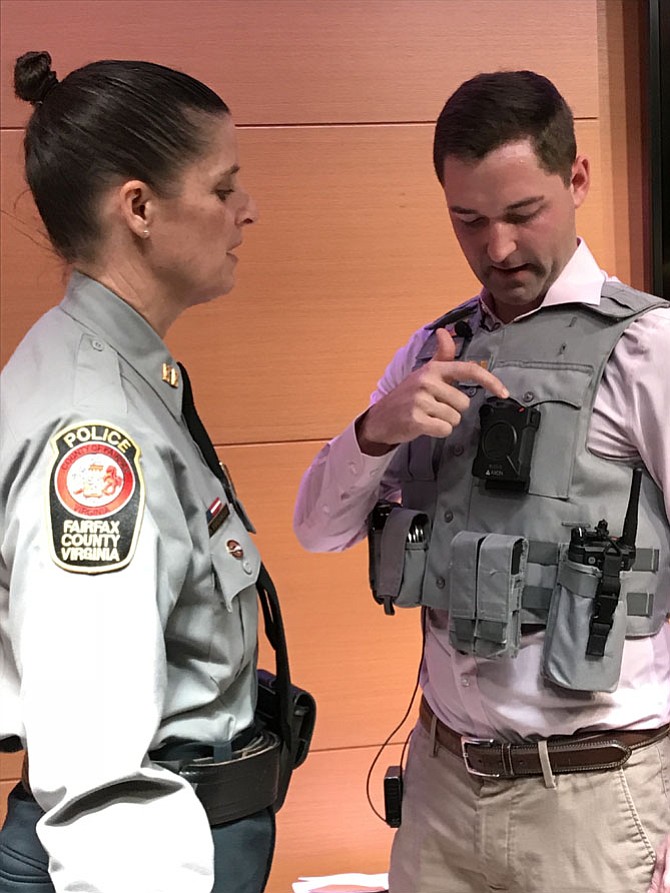Captain Chantel Cochrane, Fairfax County Police Department, explains how the new body worn camera works as a member of the media tries one on at the Friday, Feb. 16, news conference to announce the launching of the program Monday, Feb. 19, 2019. Photo by Mercia Hobson.
Fairfax County Police Department (FCPD) held a news conference, Friday, Feb. 16 at the new Fairfax County Public Safety Headquarters to announce the rollout of its Body Worn Camera Pilot Program to launch Monday, Feb. 19 at three district police stations, Mason, Mount Vernon and Reston. Full implementation of the project is March 13 with 230 cameras deployed.
According to a press release by FCPD Media Relations Bureau in December 2017, Reston was added because it differs from the two police districts that were already included in the program. "The patrol areas within the Reston District include a number of high-rise buildings as well as stops along Metro’s Silver Line. Additionally, our Reston District Police Station is the newest building among our stations and already has the physical infrastructure in place to accommodate the technical needs of the program."
Present at the news conference was Edwin C. Roessler Jr., Chief of Police, Fairfax County Police Department. He was joined by Major Christian Quinn and Captain Chantel Cochrane as well as others, including Kofi Annan, president of Fairfax NAACP. The body worn cameras were on hand and available for demonstration.
CHIEF ROESSLER explained the Body Worn Camera Pilot Program is a model program based on nationwide best practices and input from a committee of community stakeholders and organizations. Roessler explained the program is designed to understand the scope of the project’s cost, how the policy would best work, staff needed to run a full-time program, and to study whether or not body worn cameras have a reduction in complaints against officers and a reduction in the use of force deployment in the community.
One of the major questions Roessler clarified is when to turn the cameras on and off to protect privacy rights of the community while at the same time not compromising the task or safety of the officers.
During the news conference, Roessler said the department engaged multiple community stakeholders in the development of the program, as well as mental health advocates, and other community agencies that serve individuals in crisis.
According to Roessler, American University will gather and study data from the cameras to see if their use makes a difference in the community and for the police officers. The analysis will cover data and community feedback over the length of the program and will assess the impacts before, during, and after the pilot program window.
American University is conducting this study, Roessler said, "With the highest of academic rigor to make sure we can have an informed decision later on this fall."
During the news conference, Roessler pointed out that School Resource Officers would not be part of the pilot project. He emphasized if an officer who is part of the project is called for service in a school and the officer comes in as a backup officer or if the officer works off-duty at a school function, such as a sports event, the camera will be worn.
During the presentation and question and answer period, topics centered on the body cameras, Freedom of Information Act (FOIA), when videos would be released and deleted, and staffing changes.
Annan said, “The policy has gone from being really a policy written ‘for cops by cops’ to one that includes concerns from the community... I do think it was very important that the community was involved and especially from the minority community which has traditionally... had a lot of concerns with the regards of trust…This is a great opportunity to shore up that trust by helping to bolster the transparency portion that factors into the police trust."
CAPTAIN CHANTEL COCHRANE explained in detail if it is a service call meaning there is no crime in process, like a domestic dispute and the officers are let into the house on a consent basis, if the officer is asked to turn off the recording, the officer will stop recording. Notwithstanding, if anytime later while at the scene, there is a sign of something criminal, violent, or there is going to be a use of force, the officers will start recording once again. She noted there is the 30-second buffer built into the camera.
Chief Roessler added: "There are many nuances and this (pilot program) will provide us the opportunity to work with the community, so we all understand on/off, delete/not delete."
Major Christian Quinn said, "We are bringing in some limited term employees both on the IT side and the Information Technology Bureau. So, we are going to have 24/7 technical support for the program throughout its duration. We're also bringing in some folks that are going to be assigned to the Media Relations Bureau, that's where we currently process FOIA requests, Freedom of Information Act as well as visual video evidence for the Commonwealth attorney and also internal law enforcement requests."
Quinn added that by the evening of March 1 Fairfax County Police Department should have 200 cameras on the street and have all their workforce trained by March 13.
More like this story
- Fairfax County Police Launch Body Worn Camera Pilot Program
- Police Body Worn Cameras Approved in Fairfax County
- Fairfax County: Body-Worn Cameras for Police Coming Closer
- Fairfax County Police Department Officer Charged with Assault Against Community Member
- Blakley, Cochrane and Morgan Are Promoted at Fair Oaks and Sully Districts


